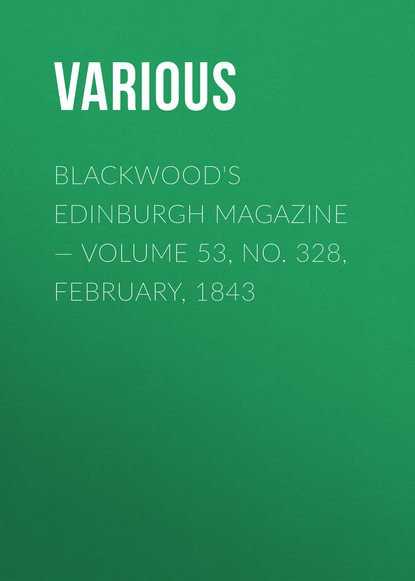По всем вопросам обращайтесь на: info@litportal.ru
(©) 2003-2024.
✖
Blackwood's Edinburgh Magazine — Volume 53, No. 328, February, 1843
Автор
Год написания книги
2018
Настройки чтения
Размер шрифта
Высота строк
Поля
To his dead sire—(the Dorian king)—
The bright-hair'd Pyrrhus[4 - Neoptolemus, the son of Achilles.] pours the wine:—
"Of every lot that life can bring,
My soul, great Father, prizes thine.
Whate'er the goods of earth, of all,
The highest and the holiest—FAME!
For when the Form in dust shall fall,
O'er dust triumphant lives the Name!
Brave Man, thy light of glory never
Shall fade, while song to man shall last;
The Living, soon from earth are pass'd,
'THE DEAD—ENDURE FOR EVER!'"
"While silent in their grief and shame,
The conquer'd hear the conqueror's praise,"
Quoth Tydeus' son, "let Hector's fame,
In me, his foe, its witness raise!
Who, battling for the altar-hearth,
A brave defender, bravely fell—
It takes not from the victor's worth,
If honour with the vanquish'd dwell.
Who falleth for the altar-hearth,
A rock and a defence laid low,
Shall leave behind him, in the foe,
The lips that speak his worth!"
Lo, Nestor now, whose stately age
Through threefold lives of mortals lives!—
The laurel'd bowl, the kingly sage
To Hector's tearful mother gives.
"Drink—in the draught new strength is glowing,
The grief it bathes forgets the smart!
O Bacchus! wond'rous boons bestowing,
Oh how thy balsam heals the heart!
Drink—in the draught new vigour gloweth,
The grief it bathes forgets the smart—
And balsam to the breaking heart,
The healing god bestoweth.
"As Niobe, when weeping mute,
To angry gods the scorn and prey,
But tasted of the charmed fruit,
And cast despair itself away;
So, while unto thy lips, its shore,
This stream of life enchanted flows,
Remember'd grief, that stung before,
Sinks down to Lethè's calm repose.
So, while unto thy lips, its shore,
The stream of life enchanted flows—
Drown'd deep in Lethè's calm repose,
The grief that stung before!"
Seized by the god—behold the dark
And dreaming Prophetess[5 - Cassandra.] arise!
She gazes from the lofty bark,
Where Home's dim vapour wraps the skies—
"A vapour, all of human birth!
As mists ascending, seen and gone,
So fade earth's great ones from the earth,
And leave the changeless gods alone!
Behind the steed that skirs away,
Or on the galley's deck—sits Care!
To-morrow comes—and Life is where?
At least—we'll live to-day!"
RUDOLPH OF HAPSBURG.—A BALLAD
[Hinrichs properly classes this striking ballad (together with the yet grander one of the "Fight with the Dragon") amongst those designed to depict and exalt the virtue of Humility. The source of the story is in Ægidius Tschudi—a Swiss chronicler—and Schiller (who, as Hinrichs suggests,) probably met with it in the researches connected with the compositions of his drama, "William Tell," appears to have adhered, with much fidelity, to the original narrative.]
At Aachen, in imperial state,
In that time-hallow'd hall renown'd,
At solemn feast King Rudolf sate,
The day that saw the hero crown'd!
Bohemia and thy Palgrave, Rhine,
Give this the feast, and that the wine;
The Arch Electoral Seven,
Like choral stars around the sun,
Gird him whose hand a world has won,
The anointed choice of Heaven.
In galleries raised above the pomp,
Press'd crowd on crowd, their panting way;
And with the joy-resounding tromp,
Rang out the million's loud hurra!
For closed at last the age of slaughter,
When human blood was pour'd as water—
LAW dawns upon the world![6 - Literally, "A judge (ein richter) was again upon the earth." The word substituted in the translation, is introduced in order to recall to the reader the sublime name given, not without justice, to Rudolf of Hapsburg, viz., "THE LIVING LAW."]
Sharp Force no more shall right the wrong,
And grind the weak to crown the strong—
War's carnage-flag is furl'd!
In Rudolf's hand the goblet shines—
And gaily round the board look'd he;
"And proud the feast, and bright the wines,
My kingly heart feels glad to me!
Yet where the lord of sweet desire,
Who moves the heart beneath the lyre,
And dulcet Sound Divine?
Dear from my youth the craft of song,











